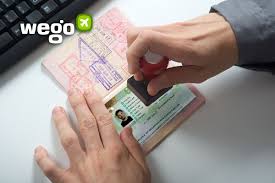US Visa for Australian Citizens: Navigating the Pathway to America

In today’s interconnected world, travel between nations serves as a cornerstone of cultural exchange, economic collaboration, and personal enrichment. For citizens of Australia, the United States of America represents not only a popular destination but also a hub of opportunity across diverse fields such as business, academia, and tourism. Navigating the intricacies of securing a US visa, however, requires a clear understanding of the process, types of visas available, and essential considerations. US VISA FOR AUSTRALIAN CITIZENS
Understanding the Basics: Types of US Visas
For Australian citizens planning a trip to the United States, the first step is determining the appropriate visa type. The US visa system categorizes visas into two primary groups: immigrant visas and non-immigrant visas. Non-immigrant visas are further subdivided into categories such as tourist visas (B-2 visa), business visas (B-1 visa), student visas (F-1 visa), exchange visitor visas (J-1 visa), and specialty occupation visas (H-1B visa), among others. Each category serves specific purposes and comes with its own set of eligibility criteria and application requirements.
Tourist and Business Visas: B-1/B-2 Visas
Among the most sought-after visas for Australian citizens are the B-1 (Business Visitor) and B-2 (Tourist Visitor) visas. The B-1 visa allows individuals to enter the US for business purposes such as meetings, conferences, or negotiations. Conversely, the B-2 visa is intended for tourism, leisure, or medical treatment. Both visa types are typically granted for a specified period, during which visitors can explore the rich tapestry of American culture, landmarks, and natural wonders from the bustling streets of New York City to the serene vistas of the Grand Canyon.
Student and Exchange Visitor Visas: F-1 and J-1 Visas
For Australian students aspiring to pursue academic excellence or participate in cultural exchange programs in the US, the F-1 (Student) and J-1 (Exchange Visitor) visas offer invaluable opportunities. The F-1 visa caters specifically to full-time students enrolled in accredited educational institutions, enabling them to engage in academic coursework and practical training through Optional Practical Training (OPT) programs post-graduation. On the other hand, the J-1 visa facilitates cultural and educational exchange by sponsoring participants in programs ranging from internships to research fellowships, fostering mutual understanding and global cooperation.
Specialty Occupation Visas: H-1B Visas
In an era characterized by technological innovation and global competitiveness, the H-1B visa holds significant relevance for Australian professionals seeking employment opportunities in specialty occupations within the United States. Designed for individuals possessing specialized knowledge and skills in fields such as information technology, engineering, medicine, or finance, the H-1B visa allows employers to sponsor foreign workers for temporary employment, subject to annual numerical limits and stringent eligibility criteria. US VISA FOR SOUTH KOREAN CITIZENS
Immigrant Visas: Permanent Residency in the United States
For Australian citizens contemplating permanent residency in the United States, immigrant visas serve as the gateway to long-term residence and citizenship. The immigrant visa process involves sponsorship by a qualifying family member or employer, with options including family-based immigrant visas (e.g., IR-1/CR-1 for spouses of US citizens or LPRs) and employment-based immigrant visas (e.g., EB-1 for individuals of extraordinary ability). Successful applicants undergo rigorous vetting procedures, including background checks and medical examinations, before receiving lawful permanent resident status (Green Card) and eventually becoming eligible for US citizenship through naturalization.
Navigating the Application Process: Tips for Success
Securing a US visa requires careful preparation and adherence to procedural guidelines. Essential steps include completing the online visa application form (DS-160), scheduling an interview at the nearest US Embassy or Consulate, paying the requisite visa application fee, and compiling supporting documentation such as passport photographs, proof of financial means, and evidence of ties to Australia. Applicants must also demonstrate compelling reasons for their visit or stay in the US, ensuring transparency and consistency throughout the visa application process.
Challenges and Considerations: Visa Denials and Waivers
Despite meticulous preparation, visa denials may occur based on various factors such as insufficient documentation, discrepancies in information, or failure to meet eligibility requirements. In such instances, applicants have the option to seek reconsideration through a visa reapplication or request for a waiver, depending on the grounds of inadmissibility. Understanding the reasons for visa denials and consulting with legal professionals or immigration advisors can facilitate informed decision-making and improve the likelihood of a successful visa application.
Conclusion: Embracing Opportunities Across Borders
In conclusion, the pursuit of a US visa for Australian citizens embodies a journey marked by exploration, opportunity, and cultural exchange. Whether traveling for leisure, academic pursuits, professional endeavors, or permanent residency, navigating the intricacies of the US visa process requires diligence, preparation, and a clear understanding of visa types, application procedures, and eligibility criteria. By embracing the challenges and opportunities inherent in international travel and immigration, Australian citizens can forge meaningful connections, pursue educational and career aspirations, and contribute to the vibrant tapestry of the United States of America.
